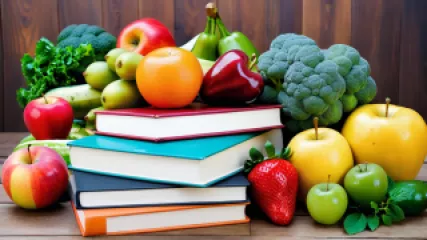Top 10 Psychology of Eating Books for Food as Self-Care
Food is not just fuel for our bodies; it also has a profound impact on our emotions, thoughts, and behaviors. The psychology of eating explores the complex relationship between food and our mental well-being. Whether you're looking to deepen your understanding of emotional eating, develop a healthier relationship with food, or explore the concept of food as self-care, there are numerous books that delve into these topics.
1. "Intuitive Eating" by Evelyn Tribole and Elyse Resch
"Intuitive Eating" challenges traditional diet culture and offers a revolutionary approach to nourishing your body and mind. This book teaches you how to reject diet mentality, honor your hunger and fullness cues, and cultivate a positive body image.
2. "The Emotional Eater's Repair Manual" by Julie Simon
In "The Emotional Eater's Repair Manual," Julie Simon provides practical strategies and tools to help individuals overcome emotional eating. Through cognitive-behavioral techniques and mindfulness practices, Simon guides readers toward healing their relationship with food.
3. "Eating Mindfully" by Susan Albers
"Eating Mindfully" explores the concept of mindful eating as a way to develop a healthy relationship with food. Susan Albers provides exercises, meditations, and reflections to help readers become more aware of their eating habits and make conscious choices.
4. "The Food and Feelings Workbook" by Karen R. Koenig
"The Food and Feelings Workbook" takes a deep dive into the emotional aspects of eating. Karen R. Koenig offers practical exercises and insights to help readers understand the connection between their emotions and their food choices.
5. "Brain over Binge" by Kathryn Hansen
In "Brain over Binge," Kathryn Hansen shares her personal journey of overcoming binge eating disorder. This book challenges the conventional wisdom about the underlying causes of binge eating and offers a unique perspective on recovery.
6. "The Intuitive Eating Workbook" by Evelyn Tribole and Elyse Resch
Building upon their groundbreaking book, Tribole and Resch created "The Intuitive Eating Workbook" as a practical guide to implementing intuitive eating principles in your daily life. This workbook includes exercises, journaling prompts, and reflections to support your journey towards food freedom.
7. "Food: The Good Girl's Drug" by Sunny Sea Gold
"Food: The Good Girl's Drug" explores the concept of using food as a coping mechanism for emotional distress. Sunny Sea Gold shares her personal experiences and provides insights into overcoming emotional eating patterns.
8. "Health at Every Size" by Linda Bacon
"Health at Every Size" challenges societal norms and weight-centric approaches to health. Linda Bacon presents an alternative paradigm that focuses on body acceptance, intuitive eating, and holistic well-being.
9. "The Mindfulness-Based Eating Solution" by Lynn Rossy
In "The Mindfulness-Based Eating Solution," Lynn Rossy combines her expertise in mindfulness and psychology to help readers develop a healthier relationship with food. This book offers practical exercises and meditations to cultivate mindful eating habits.
10. "The Binge Code" by Alison Kerr
"The Binge Code" provides a comprehensive understanding of binge eating disorder and offers strategies for breaking the binge cycle. Alison Kerr guides readers through self-reflection exercises and practical techniques to regain control over their eating habits.
While the above books are highly recommended for exploring the psychology of eating and embracing food as self-care, it's worth noting a few titles that might not align with everyone's preferences or needs:
1. "The Diet Myth" by Tim Spector
While "The Diet Myth" focuses on the science behind nutrition, it may not provide the in-depth psychological exploration desired by those seeking support for emotional eating or disordered eating patterns.
2. "The Hungry Brain" by Stephan J. Guyenet
"The Hungry Brain" delves into the neuroscience of appetite and weight regulation. While it offers valuable insights into the physiological aspects of eating, it may not address the emotional and psychological components as extensively.
3. "French Women Don't Get Fat" by Mireille Guiliano
While "French Women Don't Get Fat" provides an interesting cultural perspective on food and portion control, it may not offer the depth of psychological exploration sought by readers interested in the psychology of eating.
4. "The End of Overeating" by David A. Kessler
"The End of Overeating" focuses on the food industry's role in creating addictive processed foods. While it sheds light on external factors influencing our eating behaviors, it may not delve as deeply into the internal psychological aspects.
5. "The Obesity Code" by Jason Fung
"The Obesity Code" explores the impact of insulin and hormones on weight gain and obesity. While it provides valuable information regarding metabolic factors, it may not extensively address the psychological and emotional aspects of eating.
Exploring the psychology of eating through these books can provide valuable insights and support for those seeking to develop a healthier relationship with food. Whether you're looking for intuitive eating guidance, emotional eating strategies, or a holistic approach to well-being, these books offer a wealth of knowledge and support. Remember, nourishing your body goes beyond just the physical aspect – it's also about tending to your mental and emotional needs through food as self-care.






